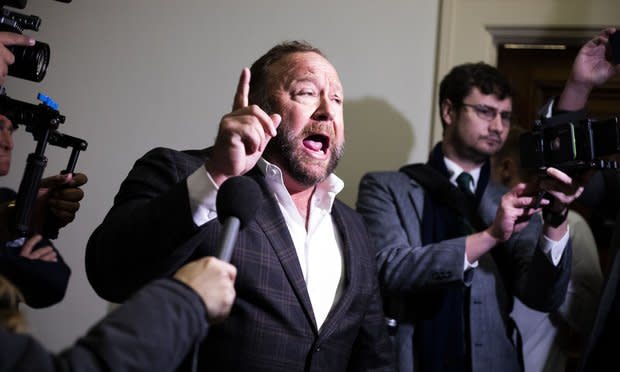Lawyers Weigh In on Order Forcing InfoWars' Alex Jones to Turn Over Company Documents

Alex Jones addresses media inside the Rayburn House Office Building, ahead of a House Judiciary hearing with testimony from Google CEO Sundar Pichai, Dec. 11, 2018. Photo: Diego M. Radzinschi/ALM
As Sandy Hook conspiracy theorist and InfoWars founder Alex Jones now faces the prospect of turning over all of the company's marketing and financial documents, Connecticut legal experts believe a Superior Court judge's ruling late last week will not have a chilling effect on mainstream media outlets.
And, those experts say, they believe the order by Judge Barbara Bellis is part of the normal discovery process and should not set off alarm bells throughout newsrooms in the country.
Bellis ruled Friday morning that the Sandy Hook families suing Jones for defamation will be granted access to the internal business, financial and marketing documents of Jones' companies. The documents and information Jones was ordered to surrender include letters, memos, emails, text messages, instant messenger logs or other electronic communications concerning, among others, shooter Adam Lanza, mention of alleged crisis actors and the investigation into the December 2012 Sandy Hook Elementary School massacre that left 26 dead.
Soon after the incident, Jones maintained the shooting was a hoax and that the families involved were paid crisis actors.
None of the four experts who spoke to the Connecticut Law Tribune described Jones' InfoWars as a legitimate news outlet. And they all agreed Bellis was right.
"In terms of discovery and the production of relevant documents, the judge made the right ruling in this case," said Susan Filan, of counsel for Cohen & Wolf,
Filan, a former prosecutor who is also a former NBC and MSNBC analyst, said, "I don't think this will have a chilling effect on the media. First of all, I do not consider him to be a legitimate news outlet and, secondly, I don't know that the First Amendment was properly invoked in this context. If you are going to profit off tragedy, you need to be willing to pay the price of being subjected to a fair legal process."
InfoWars sells several products, including survivalist gear, on its website.
University of Connecticut law professor Leslie Levin, who has taught a media and law course, said the Jones case was not a typical libel or invasion-of-privacy proceeding. In such cases, Levin said, "You normally would not get this kind of materials."
The CUTPA Factor
Levin believes it was a smart strategy for the plaintiff lawyers, who are from Bridgeport's Koskoff, Koskoff & Bieder, to invoke the Connecticut Unfair Trade Practices Act, or CUTPA.
Levin said mainstream news outlets need not fear this ruling because, unlike Jones, they do not sell other products and make sensational claims.
"Legitimate news outlets have nothing to worry about," Levin said Tuesday. "They are not selling goods in connection with their news-producing work. The Hartford Courant and the Connecticut Law Tribune, for example, are not selling products for people to buy at the same time. If, for example, the Courant were trying to sell vitamins that they claimed extended people's lives and were producing news stories that were sensational and false to try to get people to look at their website and see those products, they might have something to worry about."
Levin said the plaintiffs attorneys invoked CUTPA, alleging Jones "deliberately used false narratives as a part of a marketing scheme that brought his business millions of dollars in revenue. This was the hook, I believe, for them to be able to get all of this information."
In the end, legal experts said, the judge's ruling was part of the normal discovery process.
"All this means is that he needs to comply with whatever rules are applicable. The plaintiff requested financial information. Why is he privileged not to provide a lawful discovery request? It's that simple," said Alan Neigher, a Westport solo practitioner who specializes in media law, defamation and libel. "I'm sure this guy will put up all kinds of First Amendment issues and argue that this is an onerous burden that will disclose confidential sources. But the media has protections from releasing legitimate confidential sources for legitimate reasons, such as information that would endanger someone's life or endanger the ability to gather news effectively."
Marty Margulies, professor of law emeritus at Quinnipiac University's School of Law and a Sandy Hook resident, said, "As far as I can tell the order merely implements normal discovery requirements, mainly that parties make available to opponents all relevant information. Judges have inherent powers to limit discovery by vetoing requests that would be harassing or that seeks irrelevant material or otherwise abuses the discovery process."
Related Stories:
High Court Orders Public Release of Sandy Hook Killer's Personal Writings
Reaction to Barring Alex Jones From Social Media Sites: 'Be Careful of What You Ask For'
Alex Jones Cites Freedom of the Press as Reason to Dismiss Sandy Hook Defamation Suits Against Him



